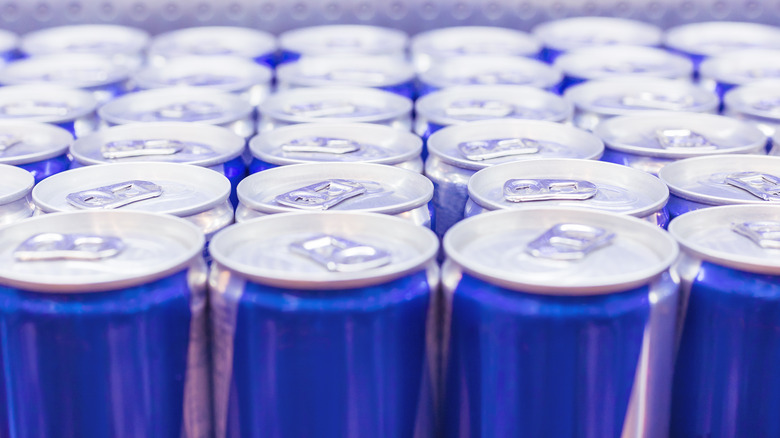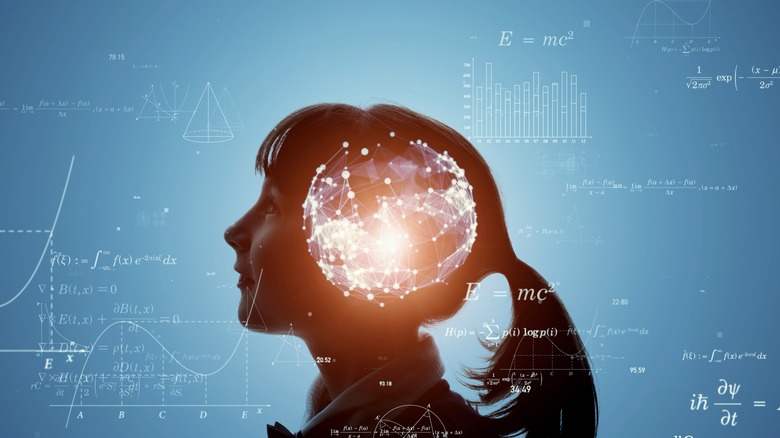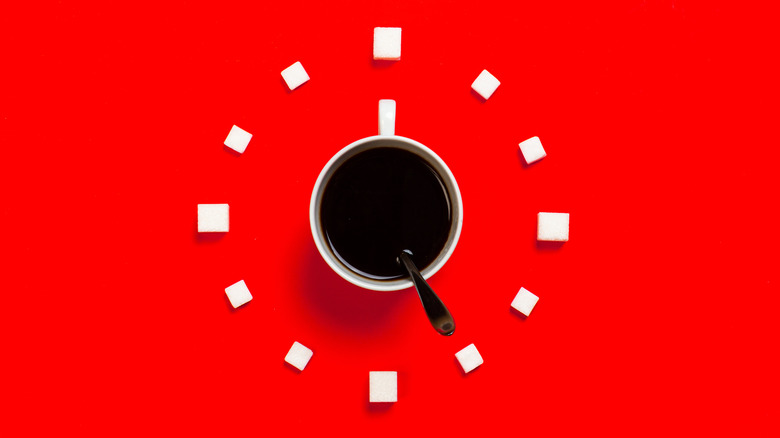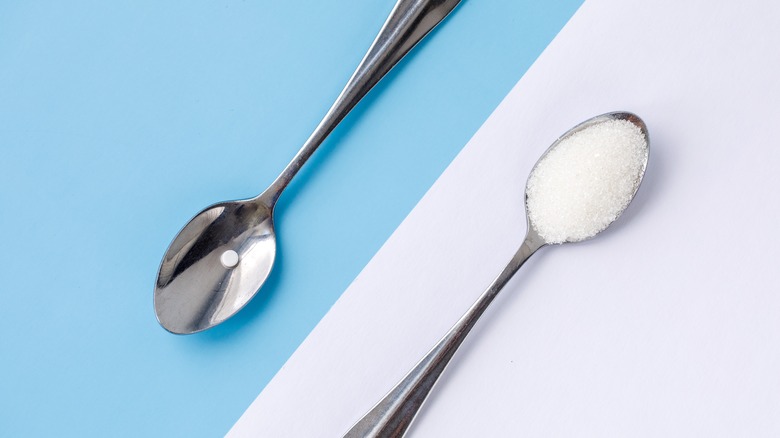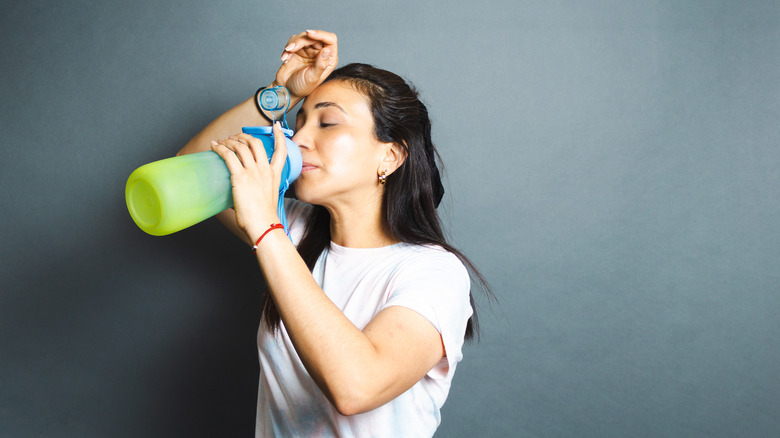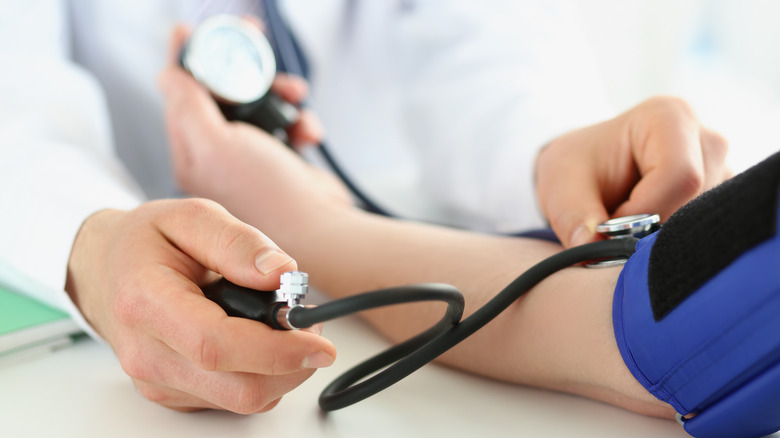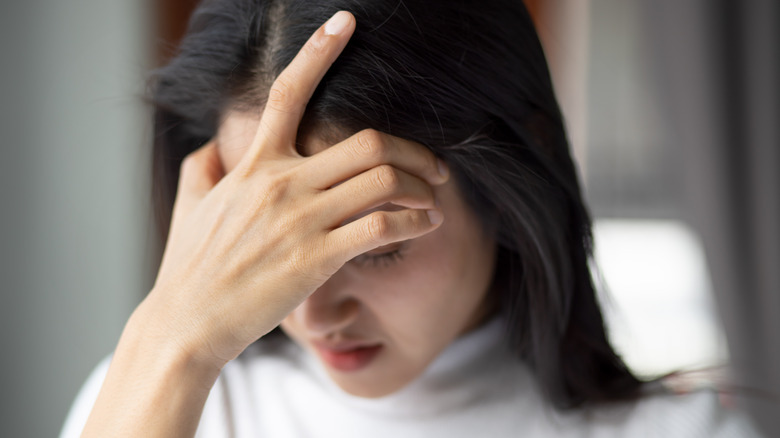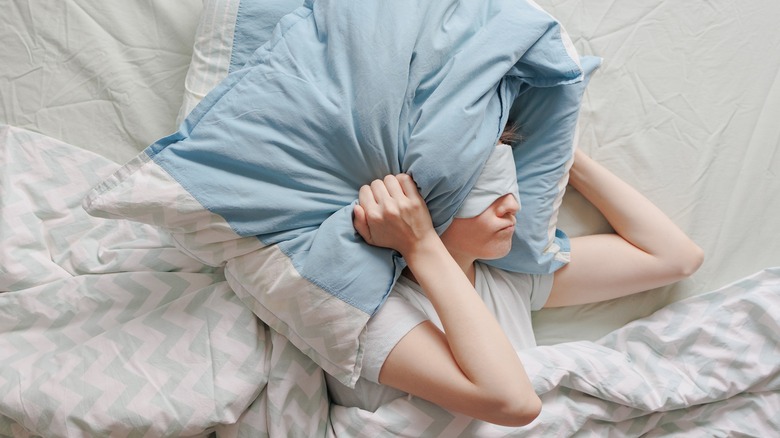10 Reasons To Think Twice About Energy Drinks
It's no secret that we as a society are pretty consistently looking for a boost: We look forward to a coffee in the morning, we try to find nourishing foods that will leave give us whatever the opposite of the food coma is, and we order energized cocktails to get us through the night.
Chances are, if you've ever written a term paper, slogged through a particularly tough day of work, or found yourself fatigued from the club scene, you've probably picked up an energy drink, and you're not alone!
In fact, you may just be in the majority. According to a report from Statista, energy drinks have a specific hold on the United States, and they even enjoyed a considerable 13% increase in 2022.
Energy drinks are part of a multi-billion dollar industry, with Red Bull drinks and Five Hour Energy shots enjoying the lion's share of the market. While energy drinks have become pretty normalized in today's society, there are pretty concerning points surrounding the drink that may make you think twice before picking up another can.
1. Energy drinks are unsuitable for children and teenagers
Caffeine is a pretty serious consideration for developing bodies, specifically in terms of brain development (via Very Well Health). Until you reach your mid-20s, your neural connections are both forming and maturing, and this process that can be disrupted by too much caffeine. Really, this is only the tip of the iceberg, as caffeine affects the body in other ways. Caffeine can also specifically disrupt bone development in young consumers.
The Pulse Seattle Children's Hospital recommends that teens consume absolutely no more than 100 milligrams of caffeine per day in order to maintain a healthy diet. But here's where things get a bit murky with energy drinks: While the FDA has regulated sodas to contain under 100 milligrams of caffeine, energy drinks do not need to adhere to the same standards.
This is because energy drinks are often sold as dietary supplements. According to Caffeine Informer, a 16-ounce can of Monster contains 160 milligrams of caffeine, which is well beyond the recommended maximum. It is in the best interests of children and teens to steer away from caffeine as a whole as long as possible.
2. Energy drinks adversely affect pregnancies
There are plenty of things that pregnant women shouldn't eat, but it's important to talk about the effect of energy drinks on unborn babies. It is somewhat well-known that pregnancy and caffeine simply do not mix, at least not well. The experts at the University of New Mexico health division clarify that pregnant bodies are much more sensitive to caffeine, and it can take much longer to process.
This can be as innocuous as not being able to sleep well at night, although too much caffeine can have much more serious effects, such as gestational diabetes, preeclampsia, low birth weight, and even miscarriage. Nonetheless, pregnant can consume up to (but always under) 200 milligrams of caffeine. While this translates to around two cups of coffee per day, this doesn't include energy drinks.
The reasoning behind this is that not only do energy drinks have a lot of caffeine in one serving, but they're also chock-full of other harmful ingredients that may adversely affect both the pregnant person and their baby. Those who are breastfeeding should abstain from consuming energy drinks, same as intoxicants and other caffeine-imbibed beverages.
3. Caffeine is the main ingredient in energy drinks
Even if you're not a child or pregnant, you should still be at least a little bit wary of caffeine. The Pulse Seattle Children's Hospital maintains that even healthy adults should not exceed a caffeine ceiling of around 400 milligrams of caffeine. Caffeine can affect the body negatively, even under the best of circumstances.
The Mayo Health Clinic translates this 400-milligram caffeine budget to around four cups of coffee or two energy shots. Once you hit your caffeine tolerance, you may experience negative symptoms such as jitteriness, anxiety, and irritability, among others.
The 400-milligram quantity is really an umbrella suggestion; some may find that they are more sensitive to caffeine's effects than others. Due to the high caffeine amount in energy drinks, it can be very easy to go over this caffeine limit.
The University of the People also raises the point that energy drinks can be consumed much more quickly than, say, coffee. This is because energy drinks are typically much sweeter and cooler in comparison. Thus, when caffeine, in the form of energy drinks, is consumed at a much faster rate, it can be all the harder for the body to regulate a larger amount of caffeine quickly.
4. The drinks are often high in sugar
Sugar, alongside caffeine, is one of the main ingredients in energy drinks (via University of the People). According to SFGate, energy drinks typically contain around 29 grams or roughly 7 teaspoons of sugar.
This is a pretty drastic amount of sugar considering that the American Heart Association recommends 6 to 9 teaspoons of sugar daily for women and men respectively. Given how much sugar American cuisine already contains, an energy drink is a pretty serious sugar investment. While it's okay to indulge every once in a while, consistent over-consumption of sugar can lead to tooth decay and weight gain, among other health issues.
Those who are familiar with energy drinks may shrug it off and opt for a sugar-free energy drink instead, but even that is not without its health risks. As Livestrong points out, sugar-free energy drinks still carry all of the same negative effects as regular energy drinks.
While there aren't many studies on the long-term effects of energy drinks, MedicalXPress reported that studies have shown that sugar-free energy drinks carry the same risk of inflammation and high blood pressure as their sugary counterparts.
5. There are other harmful ingredients on the list
Caffeine and sugar aren't the only concerning ingredients: Energy drinks tend to have a long list of ingredients that are all designed to either improve the drink's taste or effect. But, according to SFGate, it's less about the individual remaining ingredients and more about their collective effect.
Energy drinks are often riddled with other stimulants, though it may come as a surprise that these additives, such as guarana, B vitamins, carnitine, and ginseng, are often touted as healthful ingredients. None of these ingredients are bad per se; in fact, in isolation and in small doses, they are typically good for the body and can provide a relatively mild stimulation.
However, when combined and consumed in excess, these ingredients can overwhelm the body. Cardiac failure and seizure are advanced symptoms of overconsumption. These effects can even worsen when combined with caffeine and various other substances.
6. Energy drinks can cause dehydration
It may come off as counterintuitive that drinks can actually dehydrate: After all, aren't they liquid? But it's entirely possible! According to Marine Corps, energy drinks, specifically caffeine, actively remove water from the body. This cumulates in an effect that can seriously dehydrate the body, especially when working out.
Healthline notes that energy drinks may also cause the consumer to urinate more frequently, which will also contribute to dehydration. Caffeine isn't the only ingredient in energy drinks that may cause dehydration.
Energy drinks often contain taurine, an active amino acid that is often used in pre-workouts to help boost athletic performance (via Healthline). While this may provide a boost and even act as an appetite suppressant, it is extremely dangerous to take stimulants and work out as it can lead to considerable dehydration, so you might consider opting for other drinks for hydration, such as water.
7. They also raise blood pressure
Among the various ways that energy drinks can negatively affect the body, a spike in blood pressure is one that is worth talking about. Good Rx Health notes that caffeine and the medley of stimulants in a can of energy drink can gravely impact blood pressure.
For those who might be unfamiliar, blood pressure is the force it takes for your heart to pump blood around the body. High blood pressure occurs when the body needs to circulate more blood around the body to function and is often linked with habits such as smoking or consuming too much caffeine.
While it may seem like this is no big deal, as the American Heart Association aptly describes, high blood pressure is can be insidiously harmful. While high blood pressure may not cause major ailments quickly, it can result in sexual dysfunction, hearing and vision loss, stroke, and heart failure.
Even though high blood pressure may not immediately impact young and relatively healthy people, it still will impact the body negatively, and the potential long-term effects of energy drinks are still relatively unclear. One study observed that energy drinks increased the blood pressure of young participants. Given the uncertainty around energy drinks and certainty around the dangers of high blood pressure, it seems that energy drinks may just be a risk that is not worth taking.
8. The energy often comes with a big crash
There's a saying that nothing in life is free, and unfortunately, energy drinks exemplify that. While energy drinks are often routed as quick fixes that provide a boost of energy and alertness, this is often followed by a large crash that leaves the consumer more tired than when they first indulged in the drink!
According to Medical News Today, the body will begin to process the caffeine and experience a high within the first hour after consuming an energy drink. This is where the drink's advertised highs come in: One will likely experience a sudden burst of energy upon consuming these drinks.
However, the caffeine's effect will begin to wane after an hour or so. Not only will this begin to lead to a sense of fatigue, but it will be further compounded by a sugar crash due to the copious amounts of sugar usually included in an energy drink.
After the initial first crash, the body, depending on the individual's health and age, will continue processing the energy drink. It takes around 12 hours on average for the body to process caffeine, and one might still feel withdrawal symptoms such as diarrhea and headaches even up to 24 hours later. It takes around 7 to 12 days to adjust to a specific caffeine dosage, meaning that it's possible to develop a dependence on energy drinks relatively quickly.
9. They negatively affect sleep health
The notion of sleep health has recently come into the cultural vernacular. There's no shortage of think pieces, research, and literature surrounding the topic. But as one study in 2020 so succinctly surmises, the concept of sleep health provides allows people to look at and value the individual aspects of healthful and restful sleep.
This new analysis of sleep also involves what we do during the day and how that may affect how we come to bed. This, of course, involves taking a look at where we seek our energy, including in our drinks.
As The Sleep Doctor notes, high caffeine consumption often comes at the price of truly restful sleep. Excessive caffeine consumption can lead to restlessness at night, which leads to less than stellar sleep, and more caffeine consumption during the day to compensate for a lack of energy.
This is sadly a vicious cycle, as the consumer's caffeine tolerance will adjust and need to be increased to maintain energy levels. The other main stimulants in energy drinks, such as sugar and ginseng, are believed to correlate negatively with sleep as well. At the end of the day, using energy drinks to compensate for a poor night's sleep may be a bit of a devil's pact.
10. They can exacerbate anxiety and decrease mental clarity
Beyond the physical ailments that energy drinks can cause and exacerbate, there is some indication that energy drinks can negatively impact mental health beyond the jitteriness and nervousness that are often linked to caffeine (via The Mayo Health Clinic). According to The Diabetes Education Services, energy drinks have been linked to a decrease in mental health.
The Walter Reed Army Institute of Research studied a group of 600 veterans that had returned from deployment. After learning that the majority of the group consumed energy drinks daily, the team chose to look at the effect of consistent energy drink consumption specifically.
The psychologists noted that veterans who consumed them regularly had heightened levels of stress, anxiety, and depression, especially when compared to the veterans who did not consume any energy drinks.
Notably, regular energy drink consumption is also correlated with outside substance abuse. While the study is quick to note that energy drinks do not cause mental health issues, it does caution that excessive caffeine consumption is often overlooked and underestimated.
